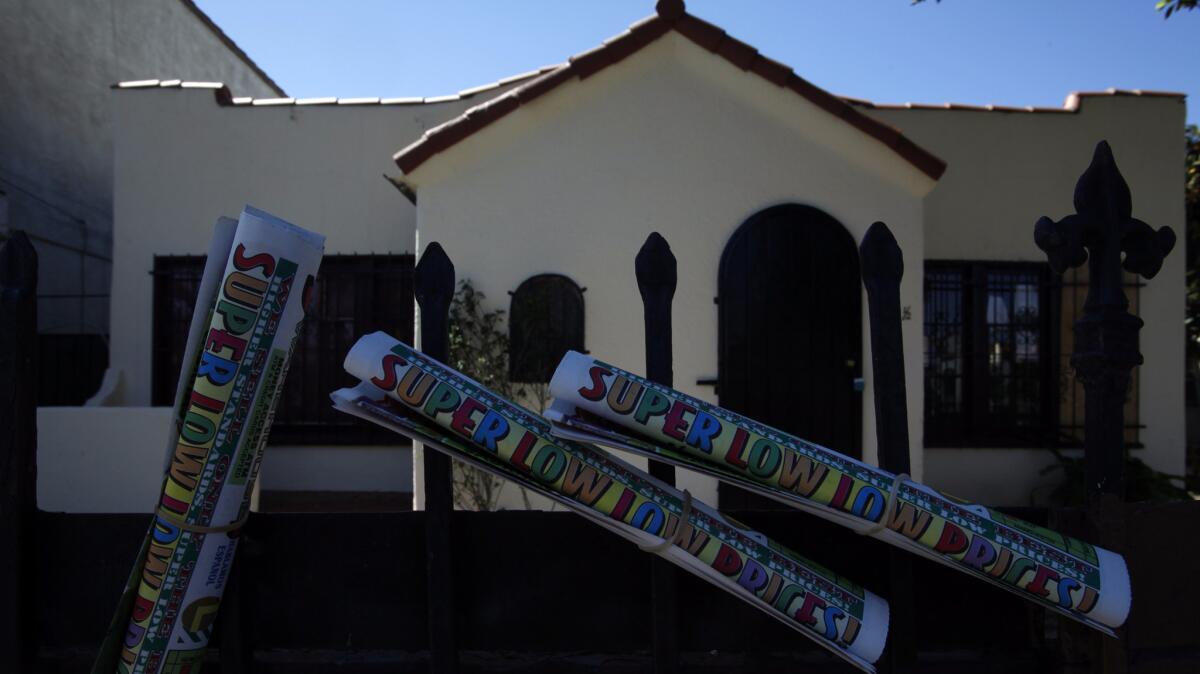U.S. Bank to pay L.A. $13.5-million over foreclosed homes that fell into disrepair

- Share via
The Los Angeles city attorney has reached a $13.5-million settlement with U.S. Bank to resolve allegations that the nation’s fifth-largest bank operated as a slumlord and allowed hundreds of foreclosed properties to deteriorate, fostering crime and blight in L.A. neighborhoods slammed by the housing crisis.
The settlement, announced Thursday, requires the Minneapolis-based firm to maintain its foreclosed properties in “accordance with all applicable laws and standards for two years.” A full-time bank employee will work with city agencies to resolve code violations of foreclosed properties across Los Angeles, the city attorney’s office said.
“Banks must be accountable for the condition of the properties they hold,” City Atty Mike Feuer said in a statement. “This significant settlement underscores my commitment that all foreclosed and vacant properties be kept up to code, so they don’t become sources of blight or magnets for crime.”
U.S. Bank spokesman Dana E. Ripley said the bank would be working with the city as well as loan servicers to ensure foreclosed properties are maintained.
“We are committed to the strength and vitality of the communities where we serve and live,” he said in a statement. “This commitment extends to the care and upkeep of neighborhoods impacted by foreclosures.”
The settlement caps an effort by former City Atty. Carmen Trutanich to hold banks accountable for foreclosed properties that became dens of squatters and drug addicts following the housing collapse. That problem was not unique to Los Angeles after the housing bubble popped and the economy tanked, forcing people from their homes when they couldn’t make payments.
In 2011, Trutanich sued Deutsche Bank, seeking hundreds of millions of dollars in penalties and restitution, as well as an injunction forcing it to clean up its foreclosed properties in the city. A year later, the city attorney’s office sued U.S. Bank, lobbing similar accusations.
In its 2012 suit against U.S. Bank, the city alleged that after an 18-month investigation it found problems with 1,500 foreclosed homes, citing more than 150 that had fallen into disrepair.
The city alleged the bank was responsible for illegally evicting some tenants and forcing others to live in dangerous conditions. It demanded the bank improve conditions for families living in the homes and clean up vacant properties.
Deutsche Bank and U.S. Bank serve as trustees for pools of loans that were turned into securities and sold to investors. Both banks argued that the city sued the wrong parties, arguing the blame for decrepit properties rested with the loan servicers, companies contracted to manage the properties.
Still, in 2013, Deutsche Bank settled its case for $10 million, though that was far less than what Trutanich had sought. The bank agreed to ensure its foreclosed properties were properly maintained within the city.
At the time, Deutsche Bank said the settlement would be paid for “by the servicers responsible for the Los Angeles properties at issue and by the securitization trusts that hold the properties.”
Similarly, Ripley, of U.S. Bank, said that most of the latest settlement will be paid by the trusts and the servicers responsible “for the properties at issue.”
He added the bank owned only one of the properties and will thus pay its “respective portion” of the settlement.
Since the filing of both lawsuits, the foreclosure crisis has rapidly receded as the economy improved and home prices soared.
In January 2009, for example, a shocking 68% of all home sales in Southern California were either short sales or homes sold out of foreclosure, according to real estate firm CoreLogic. In August, that figure had dropped to 5.2%.
The U.S. Bank settlement still needs court approval, which if received would funnel $11.9 million to the Los Angeles city attorney’s office and the L.A. County district attorney’s office to fund consumer protections across multiple industries.
The remainder would go toward to the city’s general fund to resolve municipal code violations. Feuer said he would lobby for that $1.6 million be used to hire additional building and safety inspectors, who can “grapple with issues of nuisance and blight throughout the city of Los Angeles.”
Other actions against banks over foreclosures and their impact are still pending.
In 2013 and 2014, Feuer’s office sued JPMorgan Chase & Co., Bank of America Corp., Citigroup Inc. and Wells Fargo & Co. alleging that the financial institutions engaged in predatory mortgage lending that caused a wave of foreclosures that reduced property tax revenue and increased costs for city services.
The suit against Wells Fargo was dismissed by a federal judge last year, but the city appealed and the ruling was stayed.
City attorney’s spokesman Frank T. Mateljan said all the cases “are still in the works.”
Follow me @khouriandrew on Twitter
UPDATES:
2:55 p.m.: This article was updated.
This article was originally published at 1 p.m.
More to Read
Inside the business of entertainment
The Wide Shot brings you news, analysis and insights on everything from streaming wars to production — and what it all means for the future.
You may occasionally receive promotional content from the Los Angeles Times.










